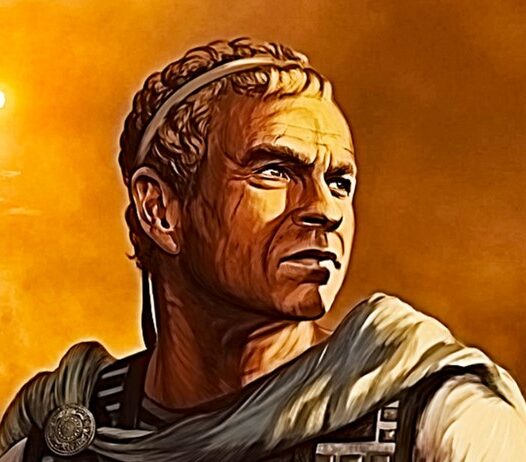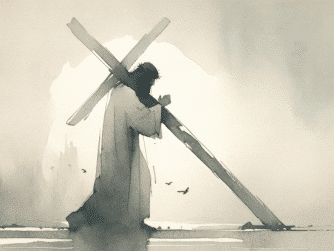During the intertestamental period (i.e., between the Old and New Testaments), there were several significant historical events, one of which was the rise of Antiochus IV Epiphanes and his ransacking of the Jewish Temple. In response to this, Jewish opposition came in the form of guerilla warfare, led by Judas Maccabee (chronicled in the Book of Maccabees). But who exactly is this mysterious Syrian King whom Christ alluded to in Matthew chapter 24 and how does he relate to the end times? Does his blasphemous act have a bearing on what is to come, regarding Israel? Join Carl now for this prophetic podcast…
Here is a complete transcript of the podcast (below)…
Friend we will continue today with our study of the book of Daniel. Now what is fascinating about this book is that as I have mentioned previously in Daniel chapters 2 and 7, God revealed to the prophet Daniel in a series of visions and dreams, the specific world empires that would arise, hundreds of years prior to their inception. Today we will continue our study with Daniel chapter 8 specifically. Now, because of the accuracy of Daniel’s visions coming to pass, it has caused several liberals scholars to claim the book of Daniel is a complete forgery, written in about the second century A.D. because they believed anyone accurately predicting future world empires is simply impossible.
However, friend, God sealed up a time capsule to prove the book of Daniel to be accurate by allowing the Qumran or Dead Sea Scrolls to be found in 1946, in which a complete copy of the Book of Daniel was found, containing the very predictions that exactly match the writings of Daniel found in our King James Bible. This threw a wrench in the works and liberal scholars had no defense against this monumental discovery of historical parchments which proved once and for all, the prophecies of Daniel in the 6th the century BC, not only came to pass exactly as he predicted but his sequence of empires was historically accurate also.
So let us now read excerpts of Daniel chapter 8, starting with verse 1, “In the third year of the reign of King Belshazzar a vision appeared unto me, even unto me Daniel, after that which appeared unto me at the first. ..(verse 3). Then I lifted up mine eyes, and saw, and, behold, there stood before the river a ram which had two horns: and the two horns were high; but one was higher than the other, and the higher came up last. 4 I saw the ram pushing westward, and northward, and southward; so that no beasts might stand before him, neither was there any that could deliver out of his hand; but he did according to his will, and became great.”
Now friend, the focus of this chapter is really the second and third kingdoms of Daniels image in chapter 2, i.e., the shoulders of silver and the thighs of brass remember that? …There isn’t much information given in Daniel chapter 2 concerning these two kingdoms but they’re expounded upon in this chapter 8. Later in this vision in verse 20, Daniel reveals the ram to represent the kings of Media and Persia. It has two horns representing the empires of the Medes and Persians separately, and the longer horn is symbolic of Persia, which is the greater power and would later take full control of this coalition. Now it says this ram pushed westward, northward, and southward, which is exactly what Persia did in expanding its Kingdom, after conquering Babylon in 539 BC. Remember each kingdom gets bigger and bigger in its sequence. Until Alexander the Grecian conqueror arrived 200 years later, Persia was the dominant world power. The Persian horn of the ram was indeed higher than the Median horn and its kingdom became greater than Media, no doubt about it; verse five:
“And as I was considering, behold, an he goat came from the west on the face of the whole earth, and touched not the ground: and the goat had a notable horn between his eyes. 6 And he came to the ram that had two horns, which I had seen standing before the river, and ran unto him in the fury of his power.”
“And I saw him come close unto the ram, and he was moved with choler (irritation or anger), and smote the ram, and brake his two horns: and there was no power in the ram to stand before him, but he cast him down to the ground, and stamped upon him: and there was none that could deliver the ram out of his hand. 8 Therefore the he goat waxed very great: and when he was strong, the great horn was broken; and for it came up four notable ones toward the four winds of heaven.“
Now there are several takeaways here that our pertinent to our study and they mirror what I’ve said in previous broadcasts. Daniel by his own admission states the ‘he goat’ is the Kingdom of Greece in verse 21. Now what’s interesting is at the time, Greece was a small insignificant country and was not yet unified, In fact, the struggle to unify Greece would continue throughout the centuries. Alexander was from the province of Macedonia, yet this goat only had one horn, not two as a normal goat would. This horn no doubt describes Alexander the Great, who as I said, conquered the expanse from Egypt to India in his rapid marches, as distinguished by the leopard of Daniel 7. Yet here Greece is described as a goat flying through the air, not touching the ground, which describes Alexander’s rapid conquests. This is why Greece is described as a swift leopard in Dan 7 also. This large horn was broken, just as Alexander was broken at the early age of 33, describing a man who conquered the known world at the time but failed to conquer himself. Now as I said before, following Alexander’s death, his vast kingdom was split between his four generals. But little did many know that from out of one province of these four generals namely the region of general Seleucus would come a type of the antichrist in the years following. Verse 9 describes this evil man:
“And out of one of them came forth a little horn, which waxed exceeding great, toward the south, and toward the east, and toward the pleasant land. 10 And it waxed great, even to the host of heaven; and it cast down some of the host and of the stars to the ground, and stamped upon them.”
Now this span of history is not well known by most Christians because this ‘little horn’ is not documented in the bible. His reign occurred between the Old and New Testaments during a time when the Jewish people were persecuted greatly. Don’t forget the book of Malachi was written in 445 BC, so scripture was silent concerning world events for almost five centuries between the Old and New Testaments. As we know, the prophecies held within the OT and book of revelation especially, are Judeo-centric and focus upon the persecution and eventual liberation of the Jewish people when Christ returns for them at His Second Coming and the destruction of His enemies.
Now the little horn of verse 9 is not the same little horn mentioned in Daniel 7. That horn is still to come, but this little horn is a type of the little horn to come and his announcement on the world stage has already occurred. His name was Antiochus IV Epiphanes. He was a Seleucid King of the Hellenistic Syrian Kingdom who reigned from 175 to 164 BC. He is best known as a ruler for the encouragement of Greek and even Roman Culture but his main claim to fame was the suppression of the Jews brought on by the War of the Maccabees. He had great power over the Holy Land especially and Syria, for a brief time and Egypt also, until he withdrew because of Roman pressure. Trouble was Antiochus thought of himself as a God. In Babylon, they built a temple of Jupiter in his honor. Then even before he had begun his reign, Antiochus contributed enormously to the building of the temple of Zeus in Athens and to the adornment of the theater.
Epiphanes, then ransacked the temple in Jerusalem, and built an altar to Zeus and sacrifices were made at the foot of this idol in the image of King Epiphanes. This is the first instance of the Abomination of Desolation, and a foreshadowing of what the antichrist will one day implement in the 3rd temple, that is yet to be built in Jerusalem. Verse ten:
“And it waxed great, even to the host of heaven; and it cast down some of the host and of the stars to the ground, and stamped upon them. 11 Yea, he magnified himself even to the prince of the host, and by him the daily sacrifice was taken away, and the place of his sanctuary was cast down. 12 And an host was given him against the daily sacrifice by reason of transgression, and it cast down the truth to the ground; and it practiced, and prospered. “
Without doubt these two verses of scripture were fulfilled when Antiochus entered the Jewish temple, magnified himself, did away with the daily sacrifices and sought the worship of himself as God. Yet we know friend, there will be a world ruler in the tribulation period to come, who will set himself up as a God and desire worship in the same form and fashion. Antiochus no doubt had all the characteristics of fulfilling these two verses accurately but he was a foreshadowing of a much more sinister future despot, namely the son of perdition, or the antichrist. The scripture states, he disregarded the starry host and set himself up as the prince of the host. Antiochus desecrated the Jewish temple and turned it into a pagan temple.
Friend although this man’s name was Antiochus, he took the name Epiphanes, it was not granted to him at birth. By taking the name Epiphanes he was declaring himself as a God because Epiphanes means, ‘glorious one,’ and the scripture makes it clear that God will not share his glory with anyone, and those who declare themselves gods will see a bitter end. The placing of an image to Zeus in the Holy temple enraged the Jewish people and aroused the Jews to commence a series of guerilla wars led by Judas Maccabee against the generals Antiochus had put in place within the region. If you desire to hear more about this you can find the story in the first book of Maccabees.
Now, throughout the 2nd century BC; the city-state of Jerusalem and Judah lay between the two great powers of Egypt and Syria which led to much frustration and bloodshed for the Jewish people. Antiochus Epiphanes killed thousands of Jews in an attempt, to stamp out the Jewish religion as many attempted to before and following him, but it was all in vain. These are God’s people and they will never be stamped out. Antiochus eventually died of an illness at 51 years old in present day Iran in 164 BC and his desire for world power died with him, as do so many others who oppose God and his people.
In verse 15, Daniel describes someone who stood beside him and this is none other than the angel Gabriel himself, a man’s voice then told the Angel Gabriel to give Daniel the interpretation of the dream. Gabriel then addresses Daniel as ‘the Son of man’ and this is what Gabriel says to him in verses 19-21:
“19 Behold, I will make you know what shall be in the last end of the indignation: for at the time appointed the end shall be. 20 The ram which thou sawest having two horns are the kings of Media and Persia. 21 And the rough goat is the king of Greece: and the great horn that is between his eyes is the first king. 22 Now that being broken, whereas four stood up for it, four kingdoms shall stand up out of the nation, but not in his power.”
And here friend Gabriel describes the coming Antichrist when he says:
“And in the latter time of their kingdom, when the transgressors are come to the full, a king of fierce countenance, and understanding dark sentences, shall stand up. 24 And his power shall be mighty, but not by his own power: and he shall destroy wonderfully, and shall prosper, and practice, and shall destroy the mighty and the holy people. 25 And through his policy also he shall cause craft to prosper in his hand; and he shall magnify himself in his heart, and by peace shall destroy many: he shall also stand up against the Prince of princes; but he shall be broken without hand.”
The fact that the Antichrist rules by a power ‘not of his own,’ indicates that he’ll be Satan-incarnate and have satanic supernatural wisdom for the power ascribed to him. He will even have the audacity to rise against the “Prince of Princes- namely Jesus Christ.” But we know the end of the book friend; we know that God will soundly defeat the Antichrist and all satanic forces. Finally, it should be noted that Daniel was quite traumatized by the numerous visions he witnessed. At the close of the chapter, he writes in verse 27, ” And I Daniel fainted, and was sick certain days; afterward I rose up, and did the king’s business; and I was astonished at the vision, but none understood it. “
Friend, Daniel chapter eight is fascinating, because it reveals Antiochus Epiphanes, who is a type of the Antichrist, and a typology of who is to come, because one day the Antichrist will commit the very same abomination of desolation spoken of by Christ himself, desiring the worship of himself as a god and finally the Jews will wake up from their deception and begin to acknowledge Jesus Christ as their Messiah.
https://carljosephministries.com/podcast/world-empires-of-the-bible-daniel-chapter-2/
https://www.biblicalarchaeology.org/daily/ancient-cultures/ancient-israel/antiochus-epiphanes-the-bibles-most-notoriously-forgotten-villain/
Title: Antiochus IV Epiphanes: Daniel Chapter 8
Related keyword searches:









That’s an excellent teaching my brother and I admit, overlooked by me as well as others. There are numerous typologies in scripture that leads to the finality of the main one or incident. However, I’ve seen several writings about the Abomination of Desolation spoken by Jesus, referring to this man Epiphrones, but Jesus was referring to the futuristic event not an historical one. Because, as you said, it was a foreshadowing of what’s to come. I wish that was detailed more to avoid unnecessary confusion. But great teaching nonetheless. Grace and peace my brother.